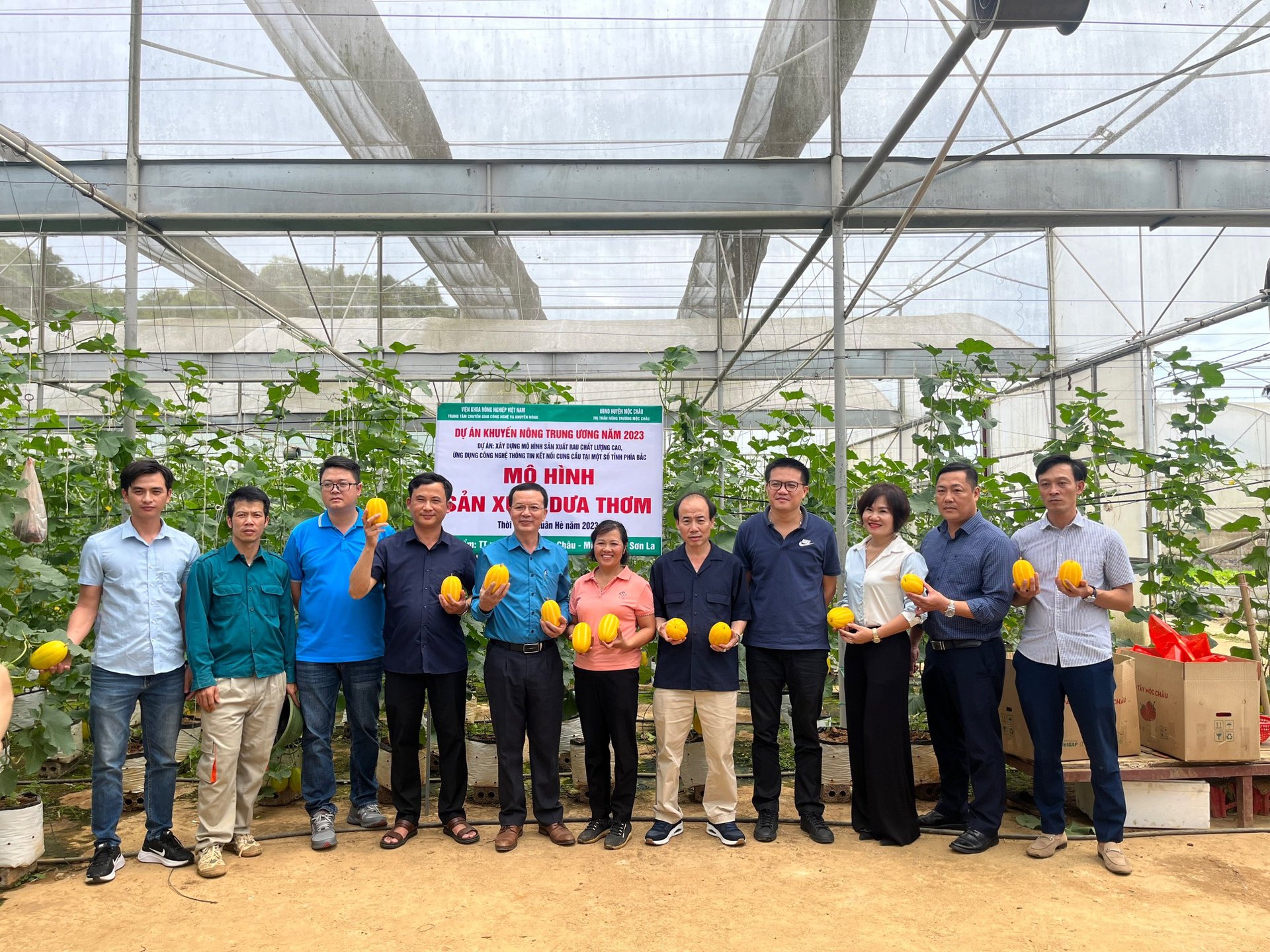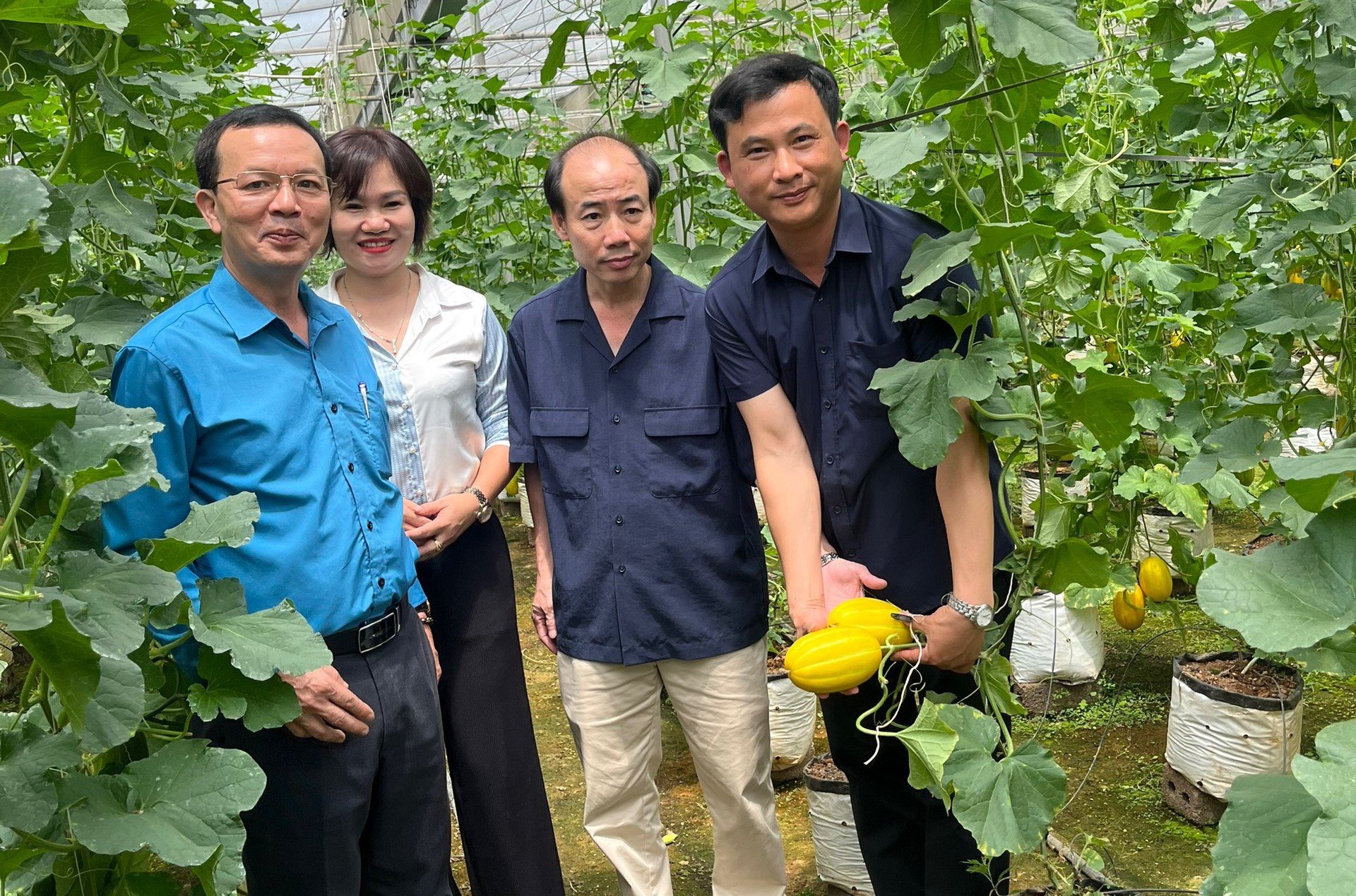November 21, 2025 | 21:41 GMT +7
November 21, 2025 | 21:41 GMT +7
Hotline: 0913.378.918
November 21, 2025 | 21:41 GMT +7
Hotline: 0913.378.918
The State has directed and promulgated many specific mechanisms and policies in recent years to attract investment in hi-tech agricultural production while helping businesses and farmers apply high technology in cultivation. As a matter of fact, the work of attracting investment for agriculture, especially high-tech agriculture, has long enjoyed many incentives from the Government.

The Korean honeydew melon production model in the farm town of Moc Chau (Moc Chau district, Son La province). Photo: Quang Linh.
Support policies on the development of high-quality safe vegetable production have been implemented fairly well, but the product consumption stage is lacking adequate attention. Enterprises investing in purchasing and processing are few, weak and unstable. On the other hand, the connections within the domestic market currently have an asymmetry problem, creating a local surplus. Places that need the product do not have it, and places that have the product are unable to circulate the goods. The phenomenon of oversupply of agricultural products still exists.
With the goal of applying information technology to build a chain model in the production of uniform and high-quality commercial vegetables, suitable for the investment conditions of farmers in some northern provinces, the Center for Technology Development and Agricultural Extension (CETDAE) from Vietnam Academy of Agricultural Sciences has implemented the agricultural extension project "Building high-quality vegetable production model while using information technology to connect supply and demand in some northern provinces”.
The project begins to be put into practice through many models in the Northern region, including a model of Korean honeydew melon production with a scale of 1.5 ha in the farm town of Moc Chau (Moc Chau district, Son La) in the spring-summer crop this year. The initial goal of the project is to build a model of honeydew melons, aiming to achieve a yield exceeding 30 tons/ha/crop. The products have beautiful designs, good quality, which meet food safety and hygiene standards.

At a time when the prices of many agricultural products are suffering a sharp decline, the Korean honeydew melon price is perceived as a good sign for farmers in Son La to continue applying the model in the next crops. Photo: Quang Linh.
Thanks to the positive response of farmers, the model has achieved ample results that exceed the initial target. To be more specific, the Korean honeydew melon variety is cultivated in a nethouse with a growth period of 75 - 80 days for harvesting. The yield is estimated at 33 - 35 tons/ha. The current selling price is VND 50,000 - 60,000/kg. Farmers in the model can earn from VND 1.65 to 1.75 billion/ha.
One thing to note is that all products of the model are supported in terms of consumption. The project being implemented has brought a new light to the people in the area. Local farmers get to learn about advanced production techniques and are introduced to the application of information technology portals to connect supply and demand.
Households participating in the model now know how to post and introduce existing products on the portal and contact businesses having the intention to purchase and consume their products.
After 3 years, the project "Building high-quality vegetable production model while using information technology to connect supply and demand in some northern provinces” has harvested many remarkable successes, such as overcoming local asymmetry and redundancy, ensuring information between raw material areas and consumption markets through establishing information channels for the consumption of commercial agricultural products.
The project also helps to diversify the use of vegetable products to serve the production and consumption needs of society, contributing to improving the lives of people in high-tech vegetable growing areas as well as areas specializing in organic or safe vegetable cultivation.
Under the topic "Research and development of quality hybrid yellow honeydew melon varieties in conditions of high technology application in Hanoi", the Fruit & Vegetable Research Institute (FAVRI) from the Vietnam Academy of Agricultural Sciences recently cooperated with Hanoi Department of Science and Technology to inspect the hybrid yellow honeydew melon production models in Chuc Son town (Chuong My district) and Yen Thuong commune (Gia Lam district). The hybrid variety Happy 6 selected and bred by the FAVRI was selected and put into production in the models of the research project.
The hybrid yellow honeydew melon variety shows promising results. According to a farmer in Yen Thuong commune, applying the technical process in accordance with the model, this spring-summer crop, she planted 1.5 ha of Happy 6 honeydew melons and harvested nearly 50 tons of fruit. The average selling price is VND 30,000 - 60,000/kg (depending on the time of harvest).
Translated by Samuel Pham

(VAN) Results from the Sustainable Durian Model Project in Dak Lak have confirmed the critical role of Yara Viet Nam in transferring advanced nutritional solutions to farmers.

(VAN) In Tuyen Quang province, livestock farmers have introduced effective models and innovative practices that significantly strengthen African Swine Fever prevention and control efforts.

(VAN) This is the study conducted by IRRI and Can Tho University on the rice straw value chain in Mekong Delta showing an economic potential of more than 6.6 trillion VND/year.

(VAN) By participating in cooperative economics, many farmers in Tay Ninh have overcome hardship, mastered clean dragon fruit cultivation techniques.

(VAN) The crossbreeding program in the former Binh Dinh province (now part of Gia Lai) has shown signs of decline, and urgent measures are needed to revive it and sustain past achievements.

(VAN) The agricultural sector agreed on a roadmap to pilot the MRV protocol and expand low-emission rice production from the 2025-2026 winter-spring crop.

(VAN) Agricultural extension officers in Quang Ninh do more than transmit knowledge; they have become a steadfast support system for farmers on the path to sustainable agricultural development.